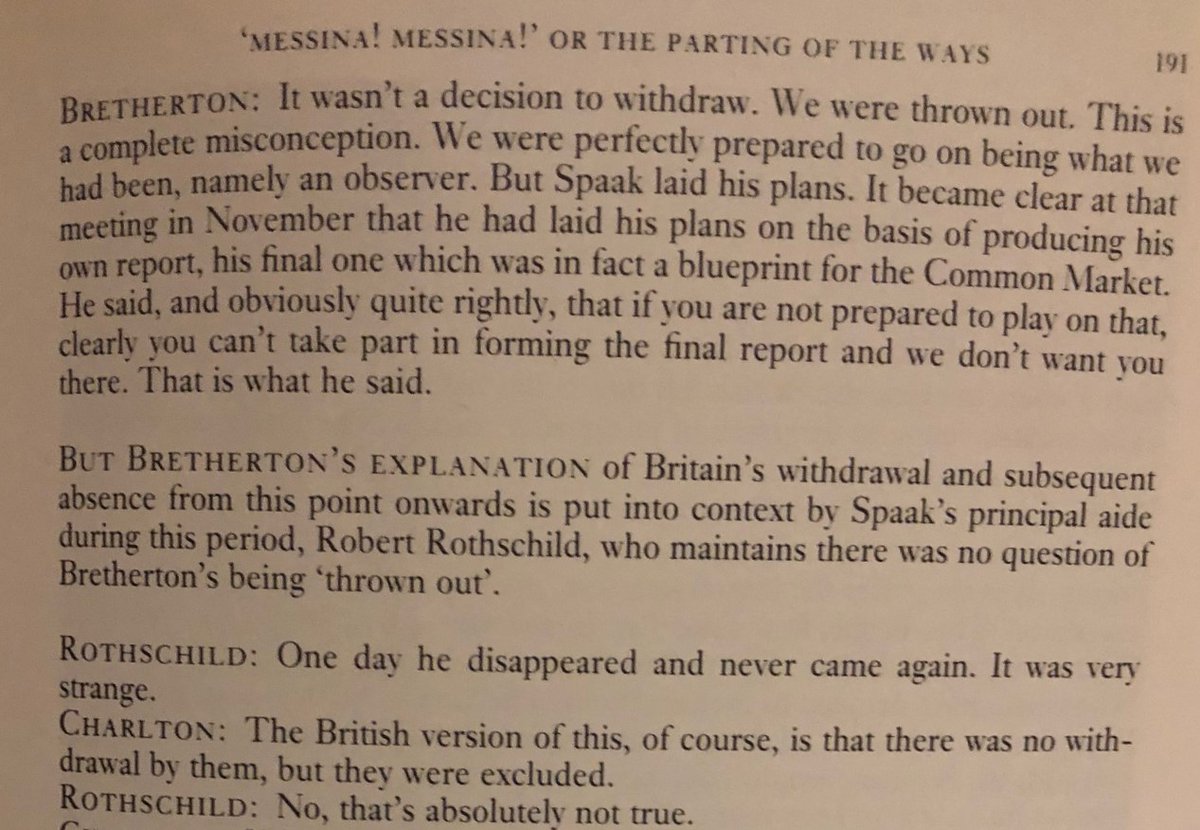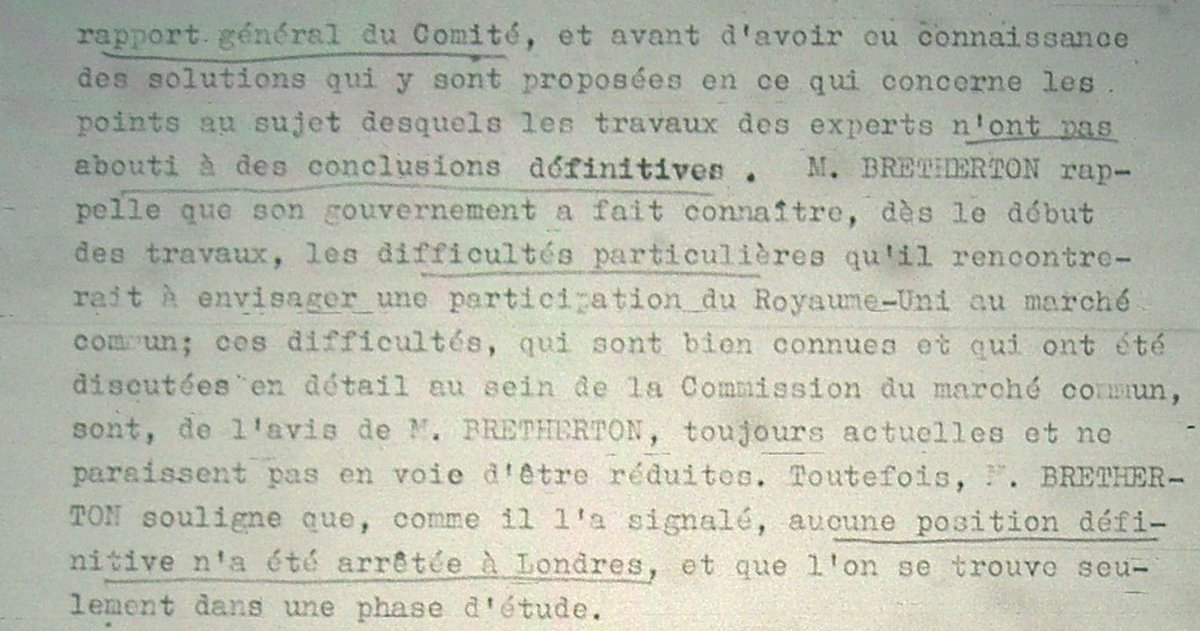Will this week see a breakthrough in the UK-EU negotiations? Possibly.
If there is white smoke on Saturday it will 65 years to the day that the UK and the then Six effectively parted ways on the discussions on what would become the EEC and the 'common market'.
Thread
If there is white smoke on Saturday it will 65 years to the day that the UK and the then Six effectively parted ways on the discussions on what would become the EEC and the 'common market'.
Thread
In 1955, Russell Bretherton, Under-Secretary at the Board of Trade, was representing the UK government at meetings of the committee set up following the June meeting in Messina of foreign ministers of Belgium, France, Italy, Luxembourg, the Netherlands and West Germany...
2/
2/
to discuss steps for further European integration.
The committee met in Brussels with Belgium's Paul-Henri Spaak chairing. Discussions focussed on establishing a customs union and common market as well as transport and atomic and conventional energy
3/
https://www.cvce.eu/en/collections/unit-content/-/unit/02bb76df-d066-4c08-a58a-d4686a3e68ff/264c5f52-00f5-4205-8be2-3460b0afcabd
The committee met in Brussels with Belgium's Paul-Henri Spaak chairing. Discussions focussed on establishing a customs union and common market as well as transport and atomic and conventional energy
3/
https://www.cvce.eu/en/collections/unit-content/-/unit/02bb76df-d066-4c08-a58a-d4686a3e68ff/264c5f52-00f5-4205-8be2-3460b0afcabd
Bretherton was more an observer than an active participant.
Robert Rothschild, Spaak’s chef de cabinet, has noted:
'Bretherton attended and, as Paul-Henri would say, "he shone everywhere with his silence” and when he did speak it was to say 'I don’t think it’s possible".'
4/
Robert Rothschild, Spaak’s chef de cabinet, has noted:
'Bretherton attended and, as Paul-Henri would say, "he shone everywhere with his silence” and when he did speak it was to say 'I don’t think it’s possible".'
4/
Rothschild added: ‘And, yes, one day, he disappeared. He never came back’
For Francois Deniau, a member of the French delegation, writing in 1977, Bretherton’s withdrawal from the Spaak Committee was more dramatic:
Bretherton: "Messieurs, I have followed your work with...
5/
For Francois Deniau, a member of the French delegation, writing in 1977, Bretherton’s withdrawal from the Spaak Committee was more dramatic:
Bretherton: "Messieurs, I have followed your work with...
5/
"interest and sympathetically. I have to tell you that the future Treaty which you are discussing a) has no chance of being agreed; b) if it were agreed, it would have no chance of being ratified; c) if it were ratified, it would have no chance of being applied...
6/
6/
"Monsieur le president, messieurs, au revoir et bonne chance."
(see:
https://www.independent.co.uk/arts-entertainment/historical-notes-mr-brethertons-retreat-from-europe-1118343.html)
7/
(see:
https://www.independent.co.uk/arts-entertainment/historical-notes-mr-brethertons-retreat-from-europe-1118343.html)
7/
Pierre Uri, who was present on 7 November 1955, interviewed in 1986, also refers to a moment of drama, of ‘rupture’, with Bretherton reading out in as neutral a voice handwritten instructions from, it was assumed, Anthony Eden, the UK Prime Minister
https://archives.eui.eu/oral_history/INT529
8/
https://archives.eui.eu/oral_history/INT529
8/
The authorship was not clear. Indeed Uri indicated in 1989 that the author was subsequently assumed to have been Rab Butler, the Chancellor of the Exchequer.
https://archives.eui.eu/oral_history/INT003
9/
https://archives.eui.eu/oral_history/INT003
9/
"no documentary evidence that anything so exciting occured'; there was no dramatic Bretherton intervention.
11/
11/
Bretherton, interviewed in 1981 for a Radio 3 series 'The Price of Victory', only refers to having 'perfectly clear instructions... to make a speech saying that [the UK is] very interested in all this and so forth, but clearly we couldn't take part in it'.
12/
12/
In fact, Bretherton claimed that 'It wasn't a decision to withdraw. We were thrown out'
For Rothschild, it was a case of Bretherton disappearing and not coming back
(Source: Michael Charlton, The Price of Victory, BBC, 1983)
13/
For Rothschild, it was a case of Bretherton disappearing and not coming back
(Source: Michael Charlton, The Price of Victory, BBC, 1983)
13/
The note of the 7 November 1955 meeting telegrammed to London from the British Embassy in Brussels makes no refererence to either a dramatic speech from Bretherton or the UK withdrawing from or being thrown out of the Spaak Committee.
14/
14/
The same is true of the official minute of the meeting. This records Bretherton noting the UK government's difficulties with participating in a customs union and the fact that they were unlikely to be resolved soon. London had, however, yet to reach a definitive position.
15/
15/
Concluding his remarks, Bretherton reiterated the point that the UK government had not reached a definitive position; although it was clear the preference was for cooperation through the OEEC rather than through anything more ambitious being considered by the Six.
16/
16/
Whether the meeting contained the drama some maintain or whether the UK withdraw or was forced out, the fact of the matter is that the meeting on the 7 November 1955 was the last that Bretherton - and the UK - attended.
17/
17/
Thereafter, the UK stood by while the Six refined their ideas, began drafting treaties and on 1 January 1958 established the European Economic Community and the European Atomic Energy Community.
Three-and-a-half years later in August 1961, the UK applied for membership.
18/
Three-and-a-half years later in August 1961, the UK applied for membership.
18/
Irrespective of whether negotiations do end this week, it's striking that 65 years on from Bretherton's final words to 'the Six' on 7 November 1955, the UK government is as reluctant today as then to engage with the integration activities of its European neighbours.
End
End

 Read on Twitter
Read on Twitter

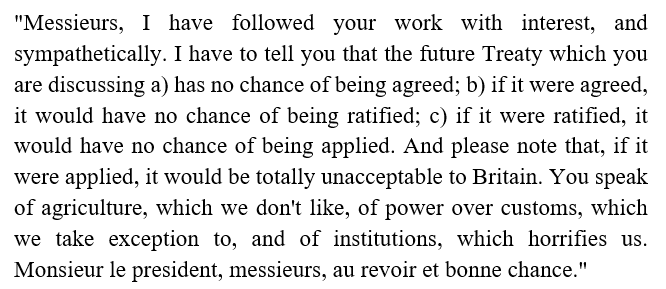
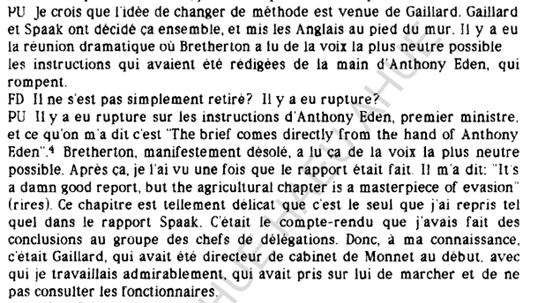

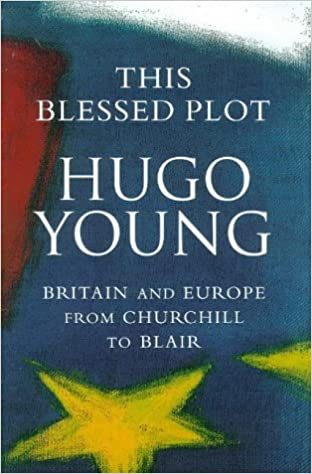

![Bretherton, interviewed in 1981 for a Radio 3 series 'The Price of Victory', only refers to having 'perfectly clear instructions... to make a speech saying that [the UK is] very interested in all this and so forth, but clearly we couldn't take part in it'.12/ Bretherton, interviewed in 1981 for a Radio 3 series 'The Price of Victory', only refers to having 'perfectly clear instructions... to make a speech saying that [the UK is] very interested in all this and so forth, but clearly we couldn't take part in it'.12/](https://pbs.twimg.com/media/ElwIzwLXEAIXG2-.jpg)
